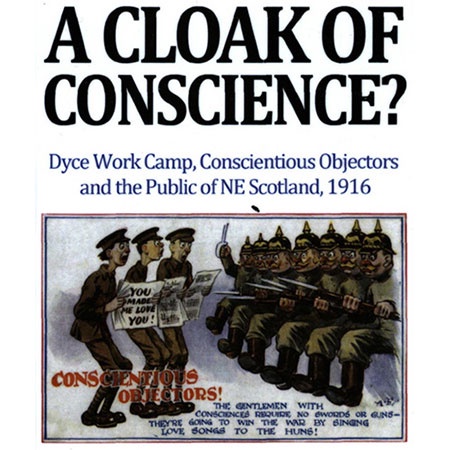Guest Collection Highlight by Dr Joyce A. Walker (MA 1994, PhD 1999)
Retired Teaching Fellow, History Department, University of Aberdeen; Author of A Cloak of Conscience? Dyce Work Camp, Conscientious Objectors and the Public of NE Scotland, 1916

The C.O. had to appear in front of a Tribunal (as did all men seeking exemption on any grounds) and prove to the satisfaction of the Tribunal that he had a conscientious objection. This was difficult to do, especially as the Tribunals were largely biased against the C.Os, seeing them as simply cowards and shirkers. Most C.Os were refused the exemption they sought, and many ended up in prison for failure to enlist, thus being in breach of the Military Service Act.
To utilise this 'spare' manpower, the Government set up Work Camps for those C.Os willing to work at non-military tasks, and one such camp was set up at Dyce, in August 1916. The 250 men were working at a granite quarry, breaking up rocks for road metal. Many of these men were University educated and had never experienced hard manual labour. One man died of pneumonia, contracted as a result of the poor conditions and hard labour.
Local people were horrified at the camp being in Dyce, concurrent as it was with the carnage of the Battle of the Somme, and a letter writing campaign ensued: on one hand the locals expressed indignation; on the other the men wrote complaining about their living and working conditions. The camp was closed after two months, and the men moved elsewhere, largely due to the public outcry.
The following quotes show two very divergent views on the topic. Is one more justified, or correct, than the other? Were C.O.'s just cowards? Saying NO took bravery!
Sir George Adam Smith, Principal of Aberdeen University, writing in 1916
"To 'conscientious objectors' who appeal to the words or the example of the Lord, it might be consciously, and far more reasonably, replied that the doctrines of non-resistance or of political peace at any price find no sanctions in the Gospels. To put peace before justice, before the redemption of the slave, before the deliverance of the tortured, and the purity of women and children, is to turn Christianity upside down."
William Polson, M.A., B.Sc., (Aberdeen) 1916 - a local conscientious objector
"I hold that the life and personality of every man is sacred, and that there is something of divinity in every human being, irrespective of nationality or colour; for example, German or British, black as well as white. Hence, I believe in the brotherhood of all men, and at all times refuse to have anything to do with the waging of war."
